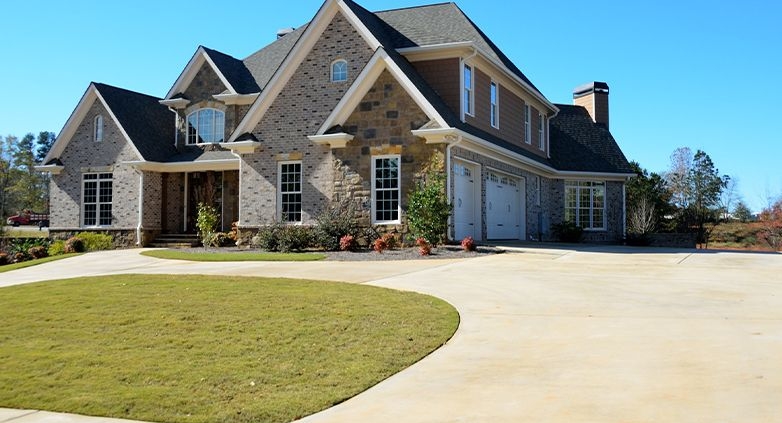Alternatives to Concrete Driveway − 9 Paving Materials to Try
While concrete is considered a standard option for driveways, it’s not the best solution for everyone. Numerous concrete driveway alternatives allow you to pick what fits your needs the best. A well-crafted driveway in complementary materials can significantly increase a property’s curb appeal.
Alternatives to concrete driveways include a range of paving materials from asphalt and brick to gravel and more, each with its own pros and cons. You need to examine all the options for installation cost, drainage, maintenance, and longevity to decide which concrete alternative is the best solution for your driveway.
Read on to learn more about nine alternative paving materials to concrete you can use for your driveway.
What are the available driveway materials?
- Gravel
- Shell
- Asphalt
- Tar and chip
- Brick
- Sandstone paving
- Permeable Pavers
- Pavers
- Cobblestone
- Concrete
What are cheaper alternatives to concrete driveways?
While many contractors will charge a set paving cost for driveway construction rather than by the square foot, the national average cost for a concrete driveway is $6 per square foot, and costs can rise substantially with a colored or stamped finish. Concrete driveways can last roughly 25 years but require annual maintenance and is not a DIY-friendly material for large-scale projects like a driveway.
Keep in mind costs for any project will fluctuate depending on whether you’re installing a new driveway or resurfacing an old one, slope, and drainage options. With the high concrete construction cost and expensive repairs, it’s not the ideal choice for every driveway. For some homeowners, the installation cost is the primary concern.
1. Gravel
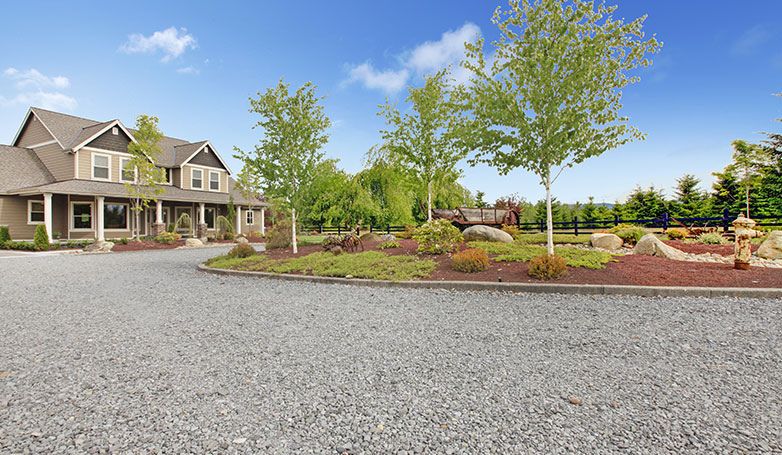
Gravel is one of the cheapest driveway building materials and by far the most accessible to work with when doing the work yourself. With time and effort, you can construct your own gravel driveway. You should expect to pay roughly $1-3 per square foot for a gravel driveway, depending on the type of gravel you choose. Maintenance is hassle-free since you only need to monitor for dips, which are easy to fill.
Pros:
- Gravel is cost-effective and easily accessible.
- Easy, cheap maintenance
- Diverse options for design
- Easy installation, ready to use right away
- Resistant to extreme weather
- Aids with water drainage
Cons:
- Snow and ice removal is harder and often requires salt.
- Unattractive ruts form in heavily used areas
- Gravel dust can be dirty and tiresome.
2. Shell
Crushed clamshells are both an environmentally friendly option and a cheap way to build your driveway. Shell driveways remain consistently stable throughout their lifespan because they break down into smaller pieces as you use the driveway and compact evenly to create a stable, level surface that prevents ruts and potholes. As the shells break down, they also release nutrients into the surrounding soil.
Shells are harvested from beaches without harming the shoreline and are cheapest in ocean-bordering states like Florida, Georgia, and Alabama. You should expect to pay roughly $0.60 per square foot, but you must factor transportation costs into your budget. Many homeowners said crushed shells were hard to find, so demand may drive costs higher.
Pros:
- Environmentally friendly
- Inexpensive in coastal states
- Breaks down to make driveway stronger
Cons:
- Difficult to find recently
- Transportation costs
- Sharp edges on bare feet
- More difficult snow and ice removal
Best alternatives to repaving a concrete driveway
If you already have a driveway and it simply needs resurfacing, you have options to reduce costs. With the base structure already in place, your contractor only needs to remove the surface layer before they can proceed with the new driveway, saving you the foundation materials and labor costs.
3. Asphalt
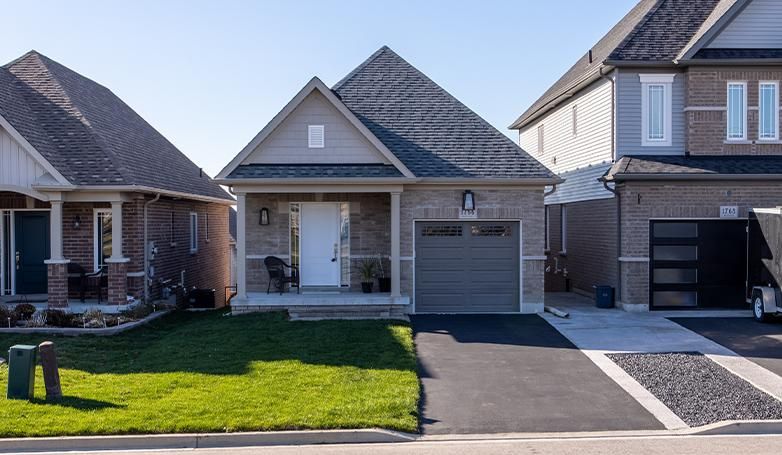
Asphalt driveways are a solid alternative to concrete, sometimes at half the cost. If you want to resurface your existing driveway, asphalt is an excellent choice. At roughly $2-4 per square foot, asphalt is cheaper than concrete and has easier, less expensive maintenance with nearly as long a lifespan.
Pros:
- Cracks aren’t as unsightly as they are with concrete and are easy to repair yourself.
- The lifespan of 15 to 20 years
- Stands up to cold weather better than concrete
Cons:
- The dark color generates heat and can become gooey in intense sun.
- Lack of design options
- Can be damaged by plants and tree roots
4. Tar and chip
Tar and chip driveways also called chip and seal or macadam, use a layer of crushed stone spread on top of liquid asphalt, which is then compacted. These driveways are considered low-cost at $2-5 per square foot, but you should only expect them to last up to ten years.
With a wide variety of options in color for tar and chip stone, you can create the driveway of your dreams as specifically as you like. For some, the relatively short lifespan of a macadam driveway can be a good thing because it affords the opportunity to switch things up with something new.
Pros:
- Relatively low cost, excellent for resurfacing an existing driveway
- Design options with a variety of tar and chip colors
- Low maintenance and durable
Cons:
- Difficult to find contractors for installation
- Snow and ice removal can damage the surface
- Short lifespan
Eco-friendly alternatives to concrete driveways
Environmentally conscious construction is a concern for many homeowners. Greener building materials and methods grow in popularity every year. Consumers want to build with ecologically sound materials, reducing their carbon footprint.
5. Brick
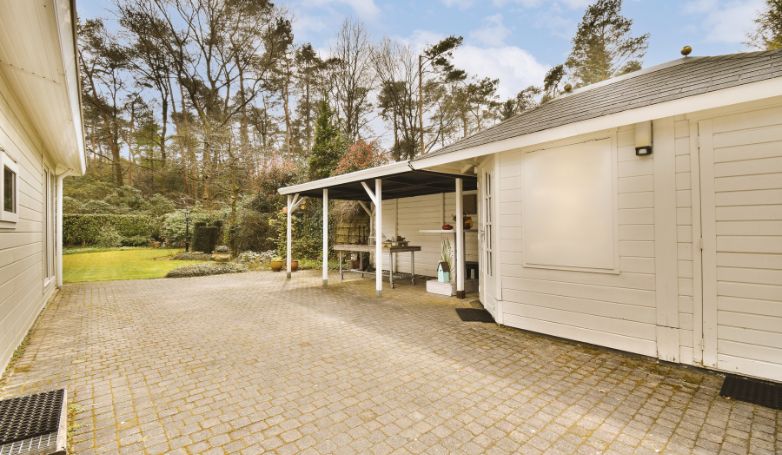
Hempcrete brick, which is created from lime, water, and industrial hemp, is lighter than its standard counterpart and absorbs atmospheric carbon dioxide. A driveway made with hempcrete bricks would require no adhesive, sand, gravel, or cement to construct. However, the eco-friendly option will cost you roughly $18-20 per square foot. The lime-based binder in hempcrete maintains the brick’s shape after years of weathering, and you can expect your hempcrete brick driveway to last a long time.
Pros:
- Non-toxic and environmentally friendly
- Waterproof and breathable with a long lifespan
- Strong and long-lasting
Cons:
- Some building codes do not include hempcrete
- Expensive to use
6. Sandstone paving
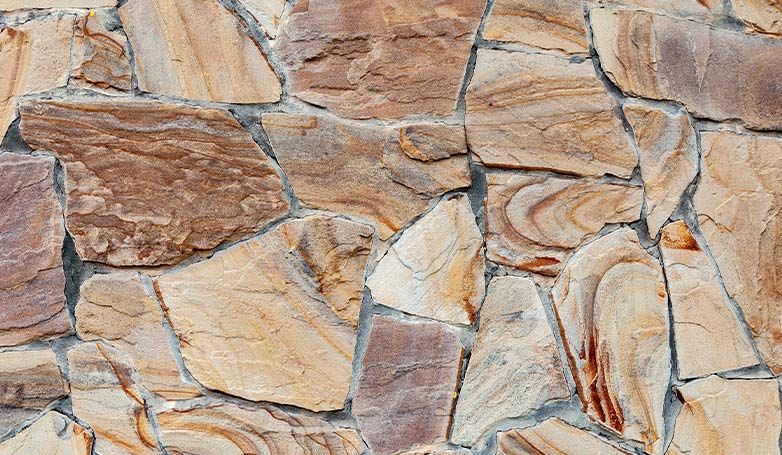
Sandstone paving is an attractive option that, while expensive, is easy to maintain, sustainable, and will last for decades when properly installed. This paving material comes in a rainbow of hues and a spectrum of grains, ensuring you find something that fits your property perfectly. The nature of sandstone makes it easy to clean and maintain with proper sealing. You should expect to pay $10-20 per square foot, with an average lifespan of 30-50 years. Sandstone paving is labor-intensive to install but not difficult to do.
Pros:
- Aesthetically-pleasing
- Long-lasting and sustainable
- Easy to install
Cons:
- Expensive
7. Permeable pavers
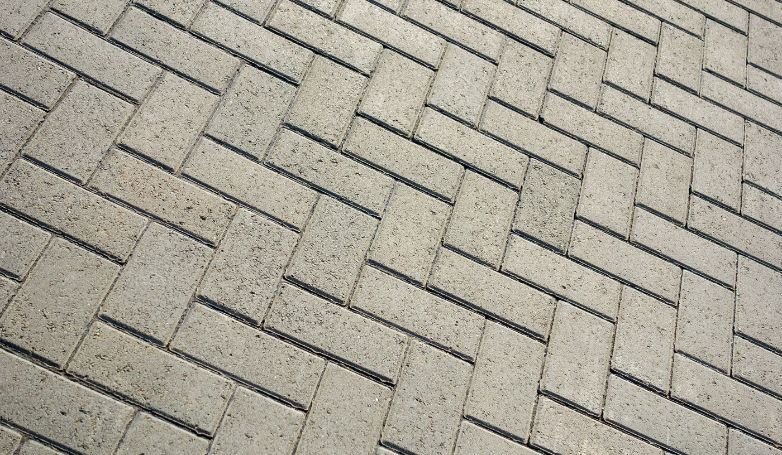
Permeable pavers are one of the most eco-friendly options you can use for your driveway. They allow rainwater to drain directly into the ground through the porous surface. Excess water is collected into an underlying reservoir, which allows it to drain into the surrounding ground slowly, preventing erosion. Some options allow grass to grow through the pavers, creating a unique look while benefitting the environment.
Pros:
- Built-in drainage system
- Eco-friendly
- Cooler surface
- Unique aesthetic
Cons:
- Ongoing maintenance
- Not as strong
- Not ideal for high-pollutant areas
What is the best low-maintenance driveway?
Some homeowners find the low-maintenance option the best. While often labor-intensive and expensive to install, you have options requiring little in the way of maintenance with the potential to last more than one hundred years.
8. Pavers
Though labor intensive and expensive to install, history shows pavers capable of lasting up to a century when properly laid. These driveways are beautiful and last beyond a lifetime, requiring little maintenance and aiding in your water drainage system. A heating system can be installed beneath the pavers in areas with heavy snowfall to prevent accumulation. After your pavers are installed, they need to be sealed, so keep in mind you need to know how long to wait before using your new driveway.
Pros:
- Can last up to 100 years
- Eco-friendly and permeable
- Beautiful aesthetic
Cons:
- Expensive
- Labor-intensive installation
- Cannot use immediately
9. Cobblestone
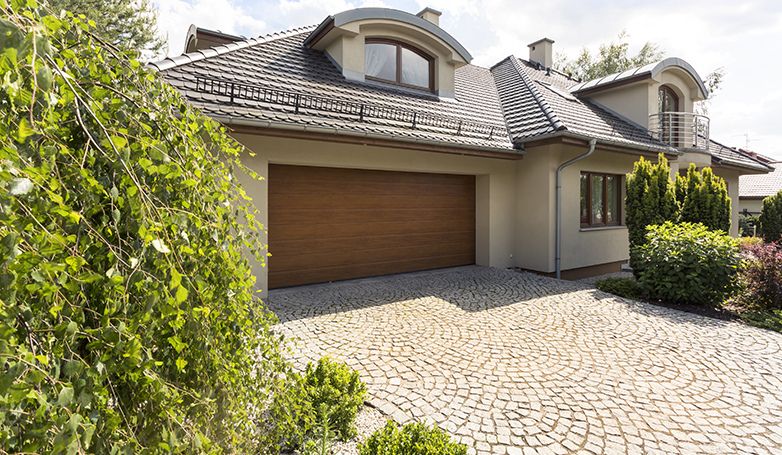
While often mistaken for other types of concrete paving stones, cobblestone is made of granite, limestone, basalt, or other natural stones. You should choose a cobblestone for your driveway based on your desired color palette and the amount of traffic your driveway hosts.
A high-end building material, cobblestone costs far more to use than many of the other methods on this list. Expect your budget for materials and installation to start at around $33 per square foot.
Pros:
- Aesthetic appeal with unlimited options
- Can last up to a century
- Load-bearing and durable
- Easy to clean and replace
Cons:
- Expensive and labor-intensive to install
- Uneven surface
- Difficult weed and snow removal
Factors to Consider When Choosing Alternatives to Concrete Driveways
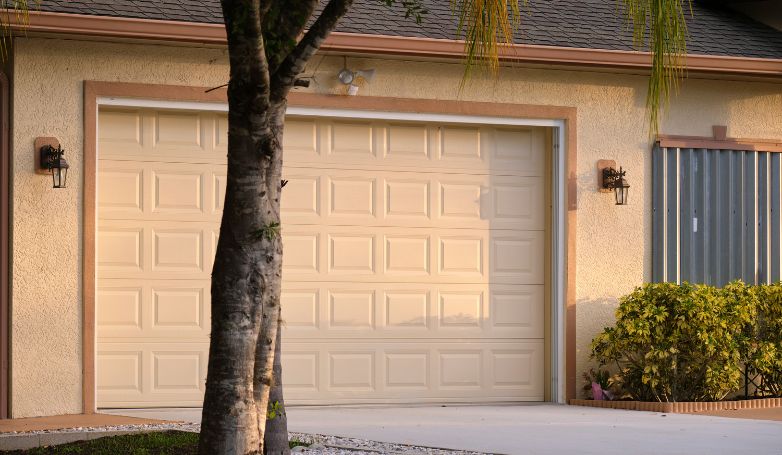
Selecting the right alternative to a concrete driveway requires thoughtful consideration of several key factors to ensure suitability and satisfaction.
Climate and Weather Considerations
Evaluate how different materials respond to your local climate. For example, asphalt is suitable for cold climates, while permeable options like gravel are ideal in rainy areas. Consider the impact of sun exposure on heat retention as well.
Local Regulations and Permits
Understand local building codes and their impact on material choices. Some areas might restrict certain materials for environmental reasons. Also, be aware of any permit requirements for specific driveway installations.
Budget Constraints
Consider both initial and long-term costs. While options like gravel are more budget-friendly upfront, consider the maintenance and repair expenses of your chosen material over time.
Aesthetic Preferences and Attractiveness
Choose a driveway material that complements your home’s architectural style. Options range from traditional brick pavers to modern stained concrete, each offering unique colors and designs to match your personal style.
In summary, when considering alternatives to concrete driveways, it’s crucial to balance practical needs with aesthetic preferences, budget limitations, and compliance with local regulations and climate considerations.
Conclusion
Armed with the knowledge about alternatives to concrete driveways, it’s time to decide the best option for your property. From inexpensive to high-end, built to last a decade or a century, there are other options for driveway construction to add to your home’s curb appeal and value.

